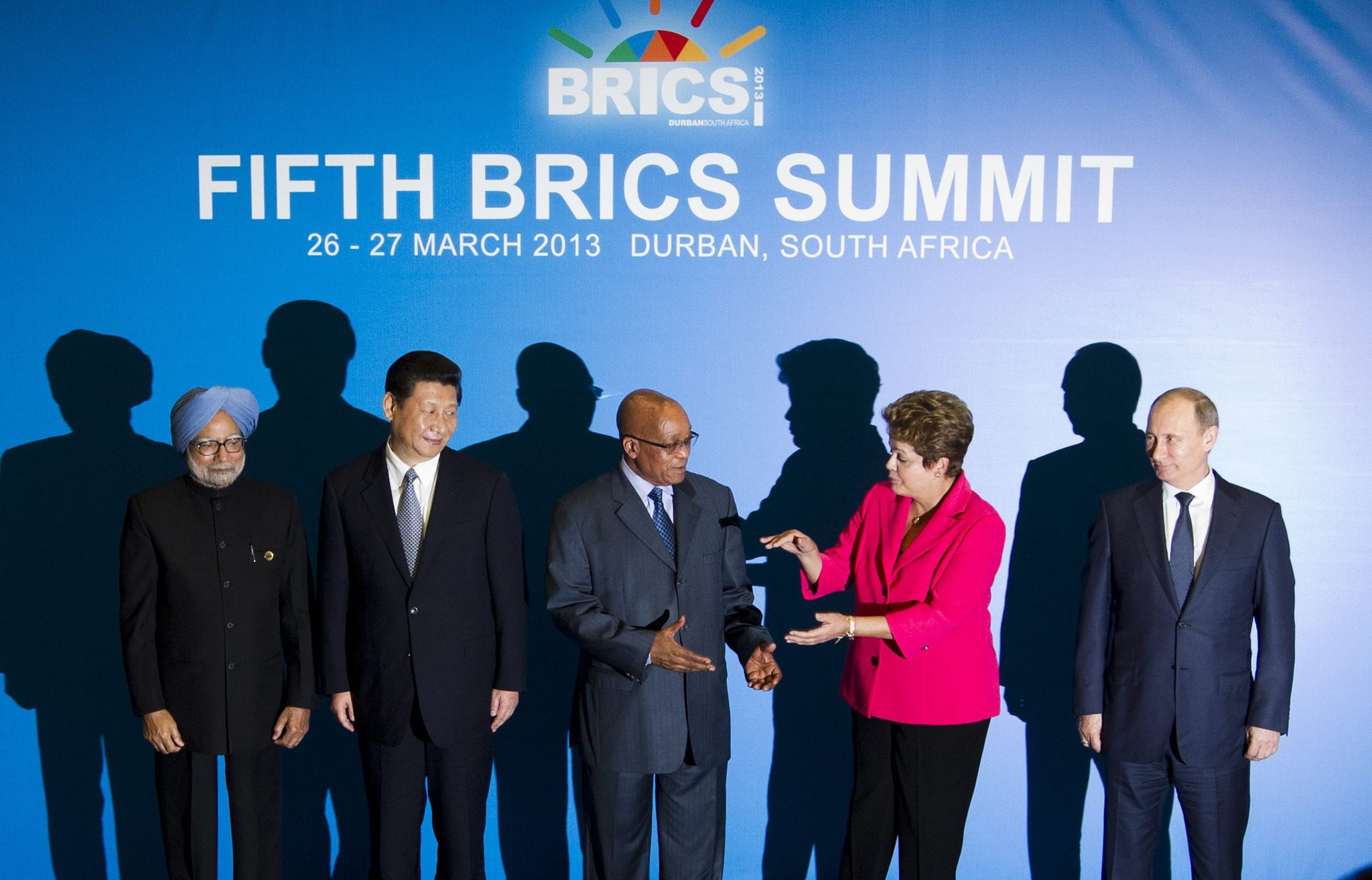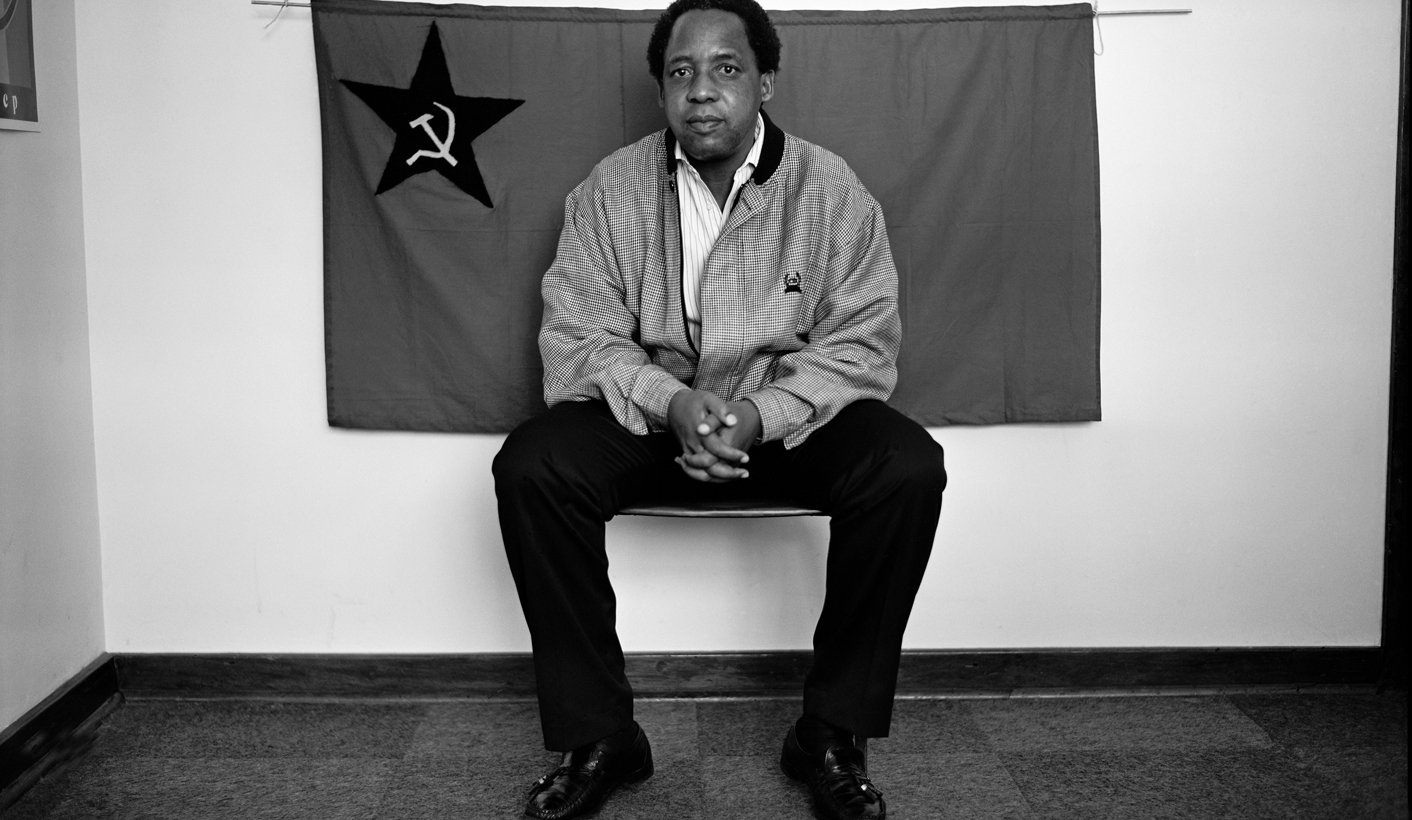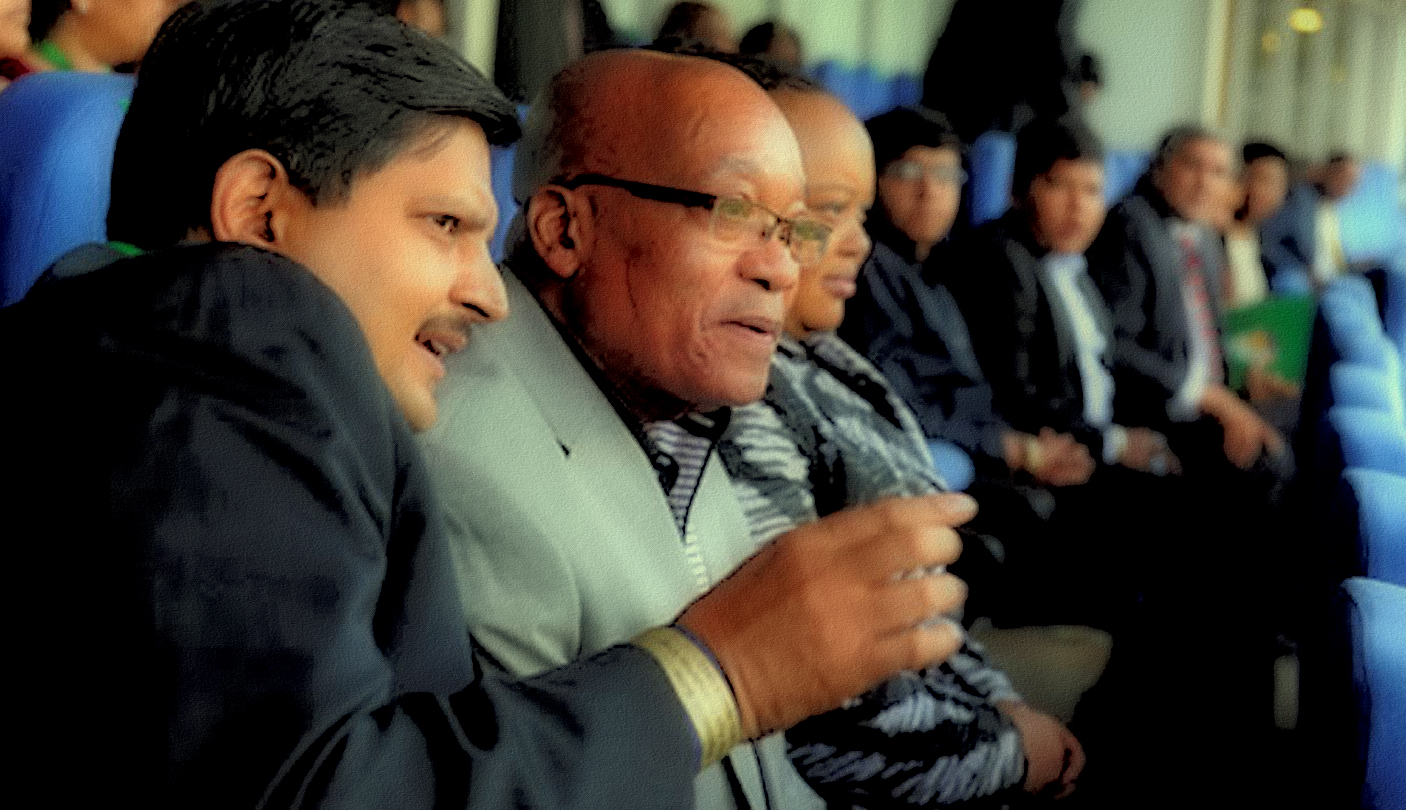Things Fall Apart: Has South Africa’s Future been Junked
South Africa’s foreign policy contends that our national interests are better safeguarded by not just focusing on our own national interests, but broadly, on the interests of our region and our continent….as a member of the Brazil, Russia, India, China and South Africa bloc (BRICS) is playing an important role towards the shifting and distribution of power internationally. This shift is expected to give rise to a multi-polar world order.
Nkosana-Mashabane, 2013
We must bring about the sanity that would dictate that power should be used to advance the well-being of humankind, and not abused as an opportunity to ‘control the world’, with no regard for the fundamental interests of the poor and marginalised…
Mbeki, 2005
Since its transition from Apartheid in 1994, South Africa has transformed itself from an international pariah state into an influential regional power in Africa, as well as a member of the G20, G77, NAM, IBSA and BRICS, making it an important voice for the so-called Global South. However, the South African miracle and its continued dominant role are increasingly being questioned, due to a range of factors.
This sentiment was emphasized when the controversial President Jacob Zuma decided to reshuffle his government and, among other changes, remove his highly respected finance and deputy finance ministers, immediately leading to fierce criticism from within his own African National Congress (ANC) governing party, as well as industry, the political opposition and a vast number of civil-society organisations. The international economic ratings agencies reacted promptly and reduced South Africa’s international credit ratings to what in popular terms is called “junk status”, which means that in the years to come it will find it increasingly difficult and more expensive to finance its monthly budget deficit, and with it its ambitions for the country’s economic and social transformation. The direct result is that the eleven million South Africans who depend on government grants every month for their livelihood should be worried, and the debt-burdened South African middle-classes will have to brace themselves for increased interest rates, a lower standard of living and increased inflation.

President Jacob Zuma attends the ANC’s 101 years celebration rallyat the Kings Park stadium in Durban on Saturday, 12 January 2013. Picture: GCIS/SAPA
The general expectation for growth in the South African economy, despite small positive growth tendencies, will most likely be reduced to a half a percent or even recession, which will reduce the ability of the government to create growth and jobs for the more that 27% of the South African population that is officially unemployed. The South African economy generally suffers from stagnation and a lack of growth, and the political elite surrounding current President Jacob Zuma seems increasingly concerned just with staying in power, despite serious cases of corruption and maladministration that have caused failing investor confidence, falling FDI and a lack of service delivery and job opportunities for a large proportion of South Africa’s citizens. Combined with chronic and nearly epidemic levels of crime, in particular violent crime, the future prospects for South Africa might seem bleak.
However, as with all political analysis there is also another, more nuanced picture of South Africa, one of a country that is going through a political maturing process, with the African National Congress, which has governed it since 1994, facing significant internal fragmentation and division, seemingly reinforcing the tendency seen during the Zuma presidency of senior members of the ANC breaking away and forming opposition parties. This process is in many ways characterized by brutal political battles for the soul of the party, but it also signifies the democratic normalization and transformation of a tripartite ANC alliance into a more dogmatic political party. The crisis in the ANC is opening up a political space for real political opposition, which is good for South African democracy. That is not to say that this process does not carry with it the inherent risk of damaging the non-racialism project or that the populism of President Zuma and EFF leader Julius Malema does not constitute a risk of more authoritarian tendencies and unconstitutional actions, only that it leaves more space for political opposition.
It is also important to stress that South Africa is not Zimbabwe, that the ANC leadership has drawn lessons from the demise and economic collapse of that country, and that President Zuma will step down as President of South Africa as prescribed by the constitution. Nonetheless more radical land-reform initiatives seems to be in the pipeline, though the biggest challenge for the ANC seems to be its lack of ability to implement policy because of a lack of institutional capacity in the country.
President Zuma’s decision to reshuffle his cabinet is still bad news for the broader South African population, but at the same time it is very unlikely that it will lead a successful call for political change or for Zuma’s ousting, since his control of the ANC seems to be so tight that within a week of the reshuffle he had managed to force his internal critics either into silence or into leaving the party. Interestingly enough this was something that the former ANC youth leader and known head of the Economic Freedom Fighter (EFF) opposition party predicted early on after the government reshuffle when he argued that the anti-Zuma critics within the ANC alliance were “cowards” and would be forced to follow the party line. However, are things really that simple, and what are the consequences for South Africa’s international role and its ability to act internationally?
From the hope of the party to its demise: the role of President Zuma
On 10th April 2017, it was 24 years since the apartheid state assassinated the leader of the South African Communist Party (SACP) and the ANC’s armed wing, Chris Hani. On the hopes and fears of the revolution, Hani stated in 1992: “What I fear is that the liberators emerge as elitists … who drive around in Mercedes Benzes and use the resources of this country … to live in palaces and to gather riches”.
The reality of South Africa in 2017 has to a large extent turned into a living proof of Hani’s fears, with President Zuma as their living symbol and incarnation. Zuma is also known as “Teflon Man”, having managed to reinvent himself politically on several occasions, and he seems to function with impunity – no scandal, accusations of corruption or breaches of the constitution seem to have any effect on or consequences for his political life. Individuals who dare raise criticisms are either deemed “racist” or political “sell-outs” in league with white imperialists, instead of the criticisms raised being looked at constructively. Instead, that is, of encouraging a constructive political dialogue and debate over how to improve state delivery, fight corruption and secure economic growth and job-creation, issues are reduced to a form of radical political rhetoric with a highly racist undertone.
South Africa, and especially certain elements within the ANC majority in Parliament, have so far been unwilling to hold President Zuma responsible for the scandals, corruption and mismanagement within the government over which he presides. In this regard, former Minister of Finance Gordhan said that the ANC needed to show “ethical leadership” and to stop tolerating brown bags of money being moved around within the party. The Zuma faction’s response so far has been the internationally highly popular exercise of counter-factual argument and preventing any kind of constructive political debate or dialogue from taking place.
The survivor
Former President Thabo Mbeki fired Zuma as his vice-president because of the charges of corruption and sexual assault and the scandals that surrounded, and still surrounds, the latter’s character. Even though Zuma is often described as a tool of political factions within the ANC and the narrow economic interests of the Gupta family, with his recent move he has shown that he is much more than a puppet for others’ narrow political and economic interests. He seems to exert tight control over the ANC and to have silenced, for now, the majority of his internal critics within the party, while the role and influence of Gupta family have become less clear.
According to the recent “state-capture” report, the Guptas have an instrumental role in and control over the leadership of the Zuma government, and with it South Africa. One thing to have materialized is that certain elements within the ANC sees the Guptas and their financial empire as a tool to undermine what in popular ANC jargon is termed “white monopoly capital”, that is, the traditionally white-owned financial and mining sectors, which are seen as a structural survival of the Apartheid era. However, the idea that the Guptas, two Indian businessmen, should be the logical tool for unleashing and realizing South Africa’s undeniably huge economic potential seems more unlikely. Corruption and personal economic gain seem to be the priority.
However, the ANC is preparing a paradigmatic change away from its current policy position of economic emancipation of the marginalized majority of South Africans based on economic growth to a policy of expropriating land and natural resources to allow economic redistribution and increased Black South African control of and participation in the economy. Strongly ideological left-wing elements within the ANC are driving this agenda, which has also been informed by the momentum to challenge for power posed by the EFF, which could potentially attract a large proportion of the ANC constituency. However, the reality is also one of a narrow political elite surrounding President Zuma that has strong economic interests in the partnership with the Gupta family and is apparently using populist political rhetoric to stay in power.
This is happening at the expense of the impoverished and unemployed majority of the South African population, who have to navigate while the political elites gamble with South Africa’s economy for their own economic benefit. By firing the Minister of the Finance, Pravan Gordhan, President Zuma now has full control of state expenditure by concentrating the political power around himself as president. The international financial markets’ direct response to this made it very clear that they no longer believe the South African government will, as promised, control government spending or reform state-owned enterprises, which are plagued by high-level corruption, incompetence and tender fraud, which has driven these institutions to the brink of collapse.
Within the last couple of months, Zuma has increasingly used the race card, which is still a highly effective political tool in South African politics, raised the need for “radical economic transformation” and threatens to even change the constitution to allow land to be expropriated without compensation. The relevant question that springs to mind is why has he not done this before, that is, ensure that the current land-reform program has been more effective. Secondly, when Zuma talks about radical economic transformation, he means the redistribution of existing wealth in South Africa, that is, from the wealthiest, predominantly white population to the impoverished, predominantly black majority, a move that would make everybody poor in South Africa, since the South African economy is not large enough to sustain the whole population. Zuma’s argument therefore represents a paradigmatic shift away from the previous ANC strategy of a radical transformation of the economy for everybody through economic growth and job creation.
The disturbing aspect seems to be that the business and political clique surrounding President Zuma does not seem to have the interests of South Africa as its priority, but rather shorter term personal gain in mind – Chris Hani’s biggest fear. Under the veil of “radical economic transformation”, the Zuma administration is seeking its support and continued legitimacy from among the marginalized majority of the population, despite the corruption and lack of (both local and central) government implementation of policy and programs in general that are mostly targeted at improving the large impoverished majority. The ability of Zuma and his elite to convince the ANC constituency that they deserve continued support, despite the increasingly inefficient service delivery and dramatic increased levels of corruption, must be seriously questioned.
The impact on South Africa’s international role
The domestic challenges facing South Africa and the uncertainty created by the negative reports on the direction and nature of the country’s future international role are having a direct impact on its influence, alliances and role internationally. Post-apartheid South Africa is not just a Western ally, something former President Mandela made very clear early on. South Africa locates its national interests and natural partners in the Global South, and in Africa in particular.
As Foreign Minister Nkosana-Mashabane argued above, the ANC government sees its membership of BRICS as both a tool for creating a more equitable international economic system and a multipolar, rule-based international political order. However, despite the progress made by the BRICS alliance, it is by no means certain that the alliance constitutes a real political and economic alternative to the existing Western-dominated economic system. This is due to the fact that the interests, economic capacity and ability, and especially normative values of the BRICS are limited and not compatible with one another.

For the Zuma government this presents a very immediate challenge, since in reality it has to function within and relate to an international economic system it considers unjust and wishes to change, as former president Thabo Mbeki argued above. The economic and political challenges facing South Africa will have direct negative effects on its ability to project actual power and influence in Africa and beyond.
The consequences of the economic crisis have been visible in the decreasing number of troops being committed to multinational peace operations, and the economic crisis will weaken South Africa’s status as a regional power. South Africa is no longer considered a big contributor to African Peace Missions by its African partners. This also means that South Africa’s attractiveness to the other BRICS members and other rising powers is less obvious. South Africa is no longer the obvious choice for international actors seeking partnerships in Africa and beyond. Proof of this is the decreasing interest in and priority paid to South Africa by especially its major trading partners in the USA and Europe.
Under the continued leadership of the politico-business axis around President Zuma, South Africa can expect some political instability in the future, a weakening regional power that will appear even weaker.

This article is published under a Creative Commons Attribution-NonCommercial 4.0 International licence.


